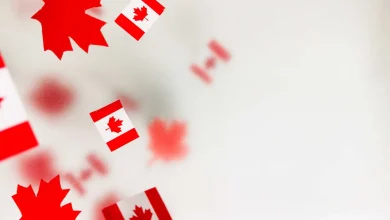On Leaving the United Nations: Our Struggles are Each Other’s

Ambassador Bob Rae in United Nations Assembly Hall/UN image
By Bob Rae
November 12, 2025
In early January of 2020, I was on vacation when I got a call from the PMO switchboard. Could I speak with Justin Trudeau? Yes, I could.
As I suspected it would be, our conversation was about the January 8th downing of Ukraine Airlines Flight 752 en route from Tehran to Kyiv and Canada beyond, and about the relevance to this disaster of the conclusions I’d reached during my experience as an advisor on the Air India bombing many years before.
I summed up as quickly as I could where previous government responses had failed in serving the families of the victims soon enough and efficiently enough.
The Prime Minister took the advice to heart and, at the end of the conversation, asked if I could come to Ottawa for a personal chat as soon as possible.
A couple of weeks later, we were eating sandwiches at his desk in the Centre Block. “I’d like you to be our next ambassador to the United Nations in New York,” he said.
I had not been expecting the question. I looked at him directly and smiled.
“Your father asked my father the same question 50 years ago,” I reminded him. “And my answer is the same as his was. It would be a great honour.”
My father, Saul Rae (pictured above), a career diplomat, had served as Canada’s permanent representative to the United Nations from 1972 to 76, after postings in Paris, Algiers, Vietnam and Washington. The prospect of filling his shoes 50 years later was both humbling and exhilarating.
Based on a combination of my upbringing in an active diplomatic family and my own experiences in law and politics over 40 years, I felt I had enough knowledge of the organizational culture of “The Department”, as my father used to call it, and sufficient policy and political experience to handle the job.
I had been heartened by the generally positive coverage the appointment, and a little apprehensive about making the leap into a role where I’d be speaking not only for myself but for the Canadian government — I’d been accustomed for years to speaking my mind, including to the media, and it would be an adjustment balancing that outspokenness with the demands of diplomacy.
The world was still in lockdown, and after spending the summer “cocooning” with our kids and grandchildren at the cottage, at the end of August, 2020, my wife Arlene and I took the drive down from Toronto through Upstate New York to New York City. I had just turned 72, felt I was in good health, and ready for the challenge ahead.
When we arrived in New York, my status as the first second-generation Canadian UN ambassador was driven home by the fact that we were living in the same Park Ave. building that Saul and mother, Lois, had lived in. The elder statesman of our Manhattan doormen remarked on first meeting that I looked a lot like my dad.
Manhattan was still reeling from the impact of COVID, which had hit the city and the UN mission team hard a few months before, so our arrival was circumscribed by the demands of the lockdown. Vaccines had still not emerged, and we operated with a maximum of caution; wearing masks, washing hands, and avoiding large crowds. The members of the Canadian Permanent Mission team were mostly working from home, and attendance at in-person meetings was severely restricted.
With UN Secretary General Antonio Guterres on November 19, 2020/UN image
I presented my credentials, heavily masked and at a great distance. I tried going into the office but was the only one there, which was actually disruptive. A “Zoom office” was set up next to our bedroom.
On weekends, Arlene and I would drive around New York, with the streets all but ours. I wanted to better understand the city that Robert Moses built, and finally read Robert Caro’s The Power Broker, long a doorstop in my study back home. We had never lived in New York and were determined to get to know it, crossing its bridges for day trips in the country, visiting Princeton, Long Island, and the Hudson Valley.
I immersed myself in diplomatic memoirs and the great histories of postwar diplomacy: Duff Cooper on Talleyrand and his own remarkable diary, Dean Acheson, George Kennan, and George Marshall; a re-read of Dag Hammarskjöld’s Markings, Brian Urquhart’s A Life in Peace and War, a biography of Ralph Bunche, as well as Lester Pearson’s work and Adam Chapnick on John Holmes.
I slowly got to know the team in the office, about 35 people at the time, and invited to lunch anyone willing to come. I chaired a series of Zoom meetings of the Peacebuilding Commission, of which Canada was chair for the next six months, and was also active in co-chairing, with Jamaica, a group called “Friends of Financing for Development”, which had taken on increased interest and importance because of the impact of COVID on the global economy.
The normally non-stop social side of UN diplomacy was limited in those early days, but having a smaller group around the table dutifully social distancing made for better conversation. Rather than formal diplomatic dinner parties, which had been such a constant in my parents’ generation, most events were an extension of work, typically called for 6:30 and over at 8:30. But as time went on and lockdown waned, we became part of the multilateral round-robin of dinners, reciprocal dinners and reciprocal-reciprocal dinners.
Meetings of the General Assembly were held in person, but high-level week went quickly and without fanfare — I had the honour of giving the speech for the government to an audience made up of masked junior-expert seat fillers carefully spaced from each other.
In an early debate that first year, I was sitting by myself at the Canada desk reading out a carefully prepared statement that was critical of the human rights records of Syria and China.
It was then that I discovered that countries specifically mentioned in a speech have a “right of reply”, of which the Syrian delegate promptly availed himself. As he was speaking, I walked down to the desk to the right of the dais and asked if I could reply to the reply. I was told “of course, Ambassador — you can reply and then reply to the reply.” I was in parliamentary heaven. A debate!
Addressing an emergency session of the UNGA on Russia’s invasion of Ukraine, March 24, 2022/UN image
I was advised in a text message by a member of the team waiting outside Assembly Hall that it was “up to me” whether I exercised the right of reply. That was good enough for me. Both the Syrian and Chinese delegates had focused their remarks on how Canada’s own human rights record was deeply flawed, and I had no right pointing out the flaws in those of other countries.
I immediately agreed with the Syrian delegate that our record was far from perfect, but pointed out that we had established a Truth and Reconciliation Commission in Canada and were determined as a country to respect a process whereby the wrongs of the past would be admitted to, and steps taken to change the policies of our country.
The Chinese delegate had added that Canada had wrongly detained the daughter of the founder of Huawei in preparation for her potential extradition to the United States, and that she was being subjected to the humiliation of house arrest. I pointed out that two Canadian prisoners were seized without charges and thrown into prisons where they were being interrogated day and night and with the lights on for 24 hours hardly allowed the Chinese to lecture Canada on human rights.
I came out of the Assembly with my staff being exceedingly polite. My phone was ringing — the minister’s office was asking me not to “amplify my remarks”. I was told not take any interviews. Two days later, the clouds suddenly cleared when my exchange was tweeted out by a Liberal MP, and word came from the Canadian Embassy in Beijing that the exchange was a “net positive”. I was suddenly allowed to talk to the media.
My own subsequent leeway with the media, my active Twitter account, and the wishes of both the office of the Prime Minister and the Foreign Minister that I should feel free to communicate with them directly gave me a greater opportunity to speak and write publicly (a completely different world than my father’s) which had its risks as well as its advantages. Not everyone was happy with what I said, and some ministers complained that I didn’t have a clear sense of my “lane”. One day, I received a package from an anonymous group of GAC employees with a desk plate that read “Hurricane Bob — at your service since 1948”.
As time went on, I became fully aware that while my leash was long it was still a leash, and could be tugged at any time. Having led a government myself, and knowing something of caucus and other disciplines, I understood the logic. Diplomacy being a holistic enterprise, with the butterfly effect of a statement on one side of the world impacting a file on the other, it was reasonable. But it also required some adjustment.
Global crises not so much disrupted as defined the rhythm of any day at the UN, an hourly feedback loop of shock-and-absorb. The collapse of Afghanistan and the Taliban takeover in 2021, the assassination of the Haitian President that same summer, the brutal seizure of power by the military junta in Myanmar, the invasion of Ukraine by Vladimir Putin and the Hamas attack on Israel and subsequent Israeli counterattack on Gaza.
These are just some of the crises that dominated the days and nights. I tried to face all with memories of conflicts past, and with the tool kit of compassion and irony that I had absorbed along the way. I also had the honour of leading the Economic and Social Council (ECOSOC) in 2024-25, which required me to develop a much broader understanding of the impact of global events on economies quite different from my own.
This in turn led to a deeper effort on my part to engage on issues like climate finance, the gap between rich and poor, and the crisis of displacement as conflict and climate change produced forcible migration on an unprecedented scale. It became clear to me that these issues would require greater, not less, engagement from Canada and other advanced economies.
Two key lessons I take away with me: the United Nations is a child of the Second World War, the Great Depression before it, of empires and their collapse and overhang, environmental degradation, centuries of patriarchy and misogyny — the list goes on. Its structures are dilapidated and overstretched.
But its struggles are our own because our struggles are each other’s. The siren calls of complacency, quietism and arrogant self-interest must be ignored. We are caught up in the world’s struggles, its triumphs and defeats, and we must continue to embrace them as we do our own private, local, and national battles — battles which may seem unprecedented today but which are merely variations of previous plagues.
May our imaginations, empathy and courage soar to meet the challenge.
Bob Rae has served as Canada’s Ambassador to the United Nations since 2020.





